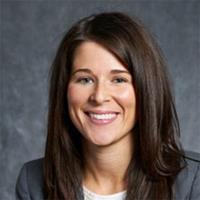Sep 30, 2022
Using financial statements to make tax forecasts a little less cloudy
In 2019, corporate taxes made up 7% of federal tax revenue, which may not sound like much, but when you do that math it’s over $424 billion. That’s a whole lot of money, and it’s used for a long list of important things. So knowing how much money corporate taxes will generate is a really big deal – which is why the Congressional Budget Office was so keen to hear about research being conducted by Danielle Green and her research partners.
 The main idea behind their work was that information in corporate financial statements could be used to improve the forecast of taxable income. If the theory held, they believed it could be helpful in two ways. First, it could be a useful forecasting tool for private sector firms who lack access to federal tax return data. And second, it could help the government authorities who do to have that access improve their forecasting models and determine how potential tax changes could affect future revenues.
The main idea behind their work was that information in corporate financial statements could be used to improve the forecast of taxable income. If the theory held, they believed it could be helpful in two ways. First, it could be a useful forecasting tool for private sector firms who lack access to federal tax return data. And second, it could help the government authorities who do to have that access improve their forecasting models and determine how potential tax changes could affect future revenues.
As it turned out, the theory worked. “We actually found that financial statement information forecasts taxable income up to three years,” said Green. They also showed that the addition of financial statement information improved estimates of future taxable income at the firm, industry, and overall corporate level by providing more timely information. But the part that got the government’s attention was the next bit. Their research also showed public financial statement information could complement proprietary tax return data, improving estimates of future taxable income for both budgetary and policy use.
“The cool thing about this project was that we presented the results to the Congressional Budget Office,” said Green. That connection was forged when the team presented the results of their research at the Illinois Tax Symposium. One of the discussants at the symposium was from the CBO, and he asked the team to talk with the tax group. “Now we’re working with them to figure out how we can improve the line-item adjustments in their forecast model using financial statement information.”
Green’s interest in taxes started after graduating from the State University of New York at Geneseo when she joined a special team at KPMG helping companies with overseas employees handle their tax issues. After completing a PhD in accounting at the University of Connecticut, she began teaching with a primary focus on taxes. For the past seven years, she’s been an assistant professor at Fordham University where she also taught a variety of other subjects, including managerial accounting.
Like many, she was forced to change her teaching style during the pandemic, when learning primarily moved online. She relished the experience, partly because she no longer had to spend two hours in heels, jokes Green, but mostly because it allowed her to connect with learners in a much more engaging way. She didn’t just get to know the students in the front of the class, said Green, she got to know the ones in the back.
“I think a lot of people don’t like online teaching because they feel like they lose that personal connection,” said Green, “but I never felt like that.” In fact, it’s her passion for online education that makes Green so well suited for her new position at Gies, where she’ll be leading a series of immersion courses — both online and in-person — that give iDegree learners the opportunity to apply their skills in the real world.
That began in August when Green co-led a team of students helping a large Seattle sports arena find new ways to generate revenue on nights when no major games were scheduled. Students spent two days meeting with local businesses before presenting their ideas directly to arena management. Experiences like that are invaluable, says Green. “Not only do they allow our learners to put their education into practice, they also help them build deeper relationships with their fellow classmates, Gies faculty, and staff.”
Green says she’s excited about working at Gies and the future of online education. “I wholeheartedly believe — particularly in the graduate space — that online education is the way we’re going and that universities that are not investing in it are really going to be left behind,” said Green. “People are looking for flexibility. They have it in work now, and they want it in education. And I want to be part of a university that is at the forefront of that.”
